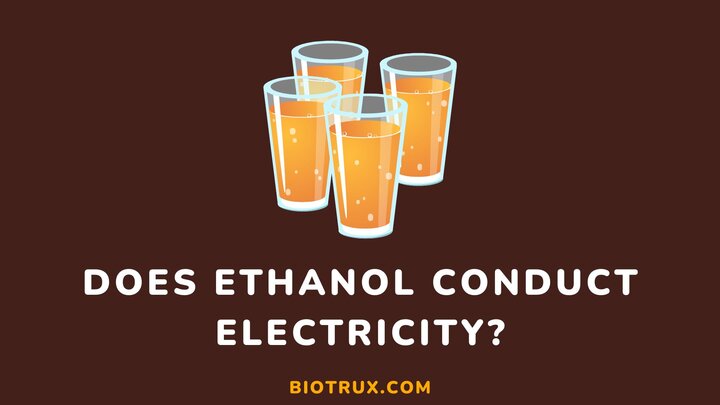Ethanol does not conduct electricity. For a liquid to conduct electricity, it must behave like an electrolyte or have charged ions that can move from one end to another in the presence of an electric field.
Ethanol does not behave this way because the covalent bond between its oxygen and hydrogen atoms in the hydroxyl (OH-) group is too strong to dissociate. And when there is no dissociation in a liquid, electrical conductivity will not occur.
This guide will explain why ethanol does not conduct electricity, its major properties and structure, and its electrical conductivity.
You will also learn how well it conducts heat and its various uses.
Properties of Ethanol
- Ethanol is a free-flowing liquid with 2 carbon atoms and a fruity odor.
- Naturally occurring ones are colorless and highly flammable.
- It has a density of 789 g/l which is 20% denser than water.
- The boiling point and melting point of ethanol are 78.5°C and -114.5°C (very low).
- It is a very weak acid that mixes readily with water and is used to dissolve other chemical substances.
Does Ethanol Conduct Electricity?

Ethanol does not conduct electricity because its molecules exhibit covalent bonds. This bond exists strongly in the (OH-) group and will keep the alcohol’s structure in place in an electric field.
In other words, dissociation will not occur, and free or mobile electrons will be absent in ethanol. This is why it does not conduct electricity despite dissolving in water easily.
Ethanol dissolves in water easily because its molecules form hydrogen bonding with each other and water molecules that exist in an aqueous solution. So when you add ethanol to normal table water (with impurities), its strong covalent bond dissuades the mixture from conducting electricity.
However, in electrolytic solutions such as salt water, ethanol will only reduce electrical conductivity, not erase it.
Electrical Resistivity of Ethanol
Electrical resistivity measures how much a substance can oppose the flow of electricity through it. Since ethanol is a very poor conductor of electricity, it has a high electrical resistance of about 19.5 MΩ⋅cm.
Does Isopropanol Conduct Electricity?
Pure isopropanol does not conduct electricity because its molecules are tightly connected by a covalent bond. Hence, there is no ionization and the presence of freely moving electrons required to conduct electricity.
However, 70% alcohol and water produced by hydrogenating acetone (isopropanol) can be conductive. This is due to the presence of free ions that are released during the reaction.
Does Ethanol Conduct Heat?
The thermal conductivity of ethanol measures how much electricity can pass through it. In pure form, ethanol is a poor conductor of heat.
It has a thermal conductivity of 0.7 W/mK.
Uses of Ethanol
- Alcohol is a popular solvent. Hence, it is great at dissolving a wide range of nonpolar compounds.
- It is responsible for the intoxicating effect of alcoholic beverages like beer, distilled spirits, and wine.
- 70 to 80% pure alcohol solutions have great disinfecting properties as seen in hand sanitizers.
- Ethanol is a regular ingredient in producing perfumes, paints, and tinctures.
- It also helps in the synthesis of other organic chemicals such as mouthwash.
- Ethanol serves as an additive to mixtures such as automotive gasoline.
FAQs
Is 70% ethanol conductive?
70% ethanol is not conductive because it is a covalent compound.
Is vodka a conductor?
Vodka is not a conductor. This is because vodka does not dissociate into charged ions in a solution.
Is 99% alcohol good for electronics?
99% alcohol is good and safe for electronics.
It is ideal for cleaning the interior components of a computer or other electronic devices.
Conclusion
Due to the covalent bond connecting its molecules, ethanol does not conduct electricity or heat. However, the mixture conducts when it dissolves in electrolytic solutions like salt water or brine.
In this scenario, the salt water does the conduction, not the alcohol. In fact, all that alcohol does to the mixture is reduce its electrical conductivity.
Despite being a very poor conductor of electricity, ethanol still plays an essential role in human life. They make up a significant part of alcoholic beverages and disinfectants.
I hope you found this guide helpful. The presence of ethanol additives in oil (or gasoline) also does not make them conductors. Check out the article on does oil conduct electricity to understand oil conductivity.
Thanks for reading.

